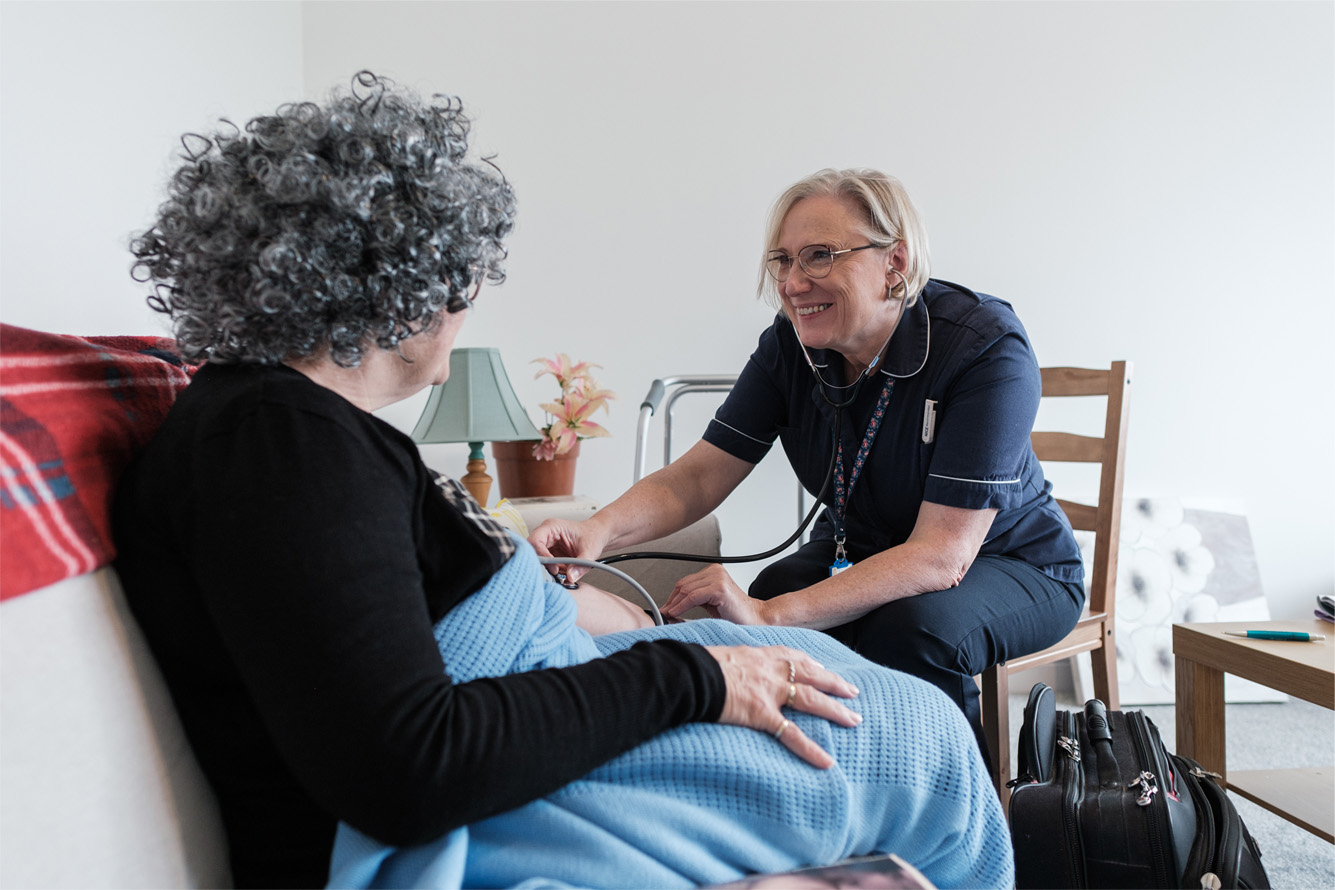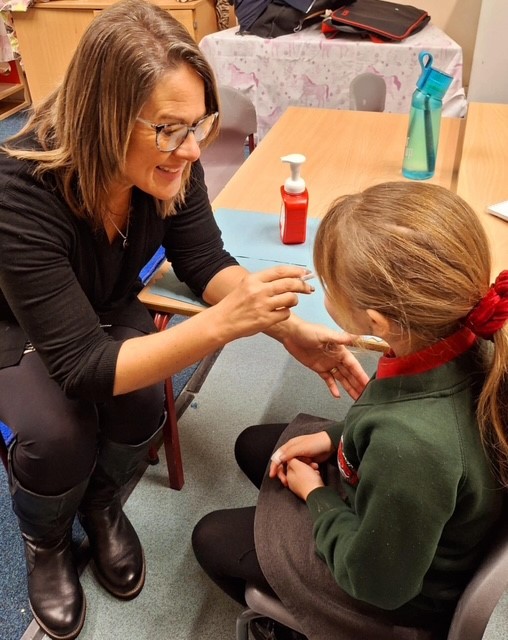PGDip Community Specialist Practice (District Nursing)

Course details
Year of entry
2026
Duration
1 YR (FT) 2 YRS (PT)
Institution Code
G53
Location
Wrexham
Why choose this course?
Broaden your understanding and develop a critical awareness of the role and responsibility of key aspects of district nursing, including the coherent and detailed knowledge at the forefront of care.
- Our course is designed for qualified nurses who hold a current registration as a nurse (part 1) with the UK Nursing and Midwifery Council Register (equivalent to parts 1 or 12 of the NMC Register). The programme enables the student to qualify as a District Nurse and record the qualification with the NMC
- The Postgraduate Diploma (Level 7) is open to students who hold a minimum of 120 credits at level 6. On successful completion of the Postgraduate Diploma (Postgraduate Diploma in Health and Social Care (District Nursing), students can continue their studies and achieve a full masters, titled MSc Health and Social Care (Community Specialist Practice)
Key course features
- You will be taught by a dedicated team of professional nurses who have backgrounds in District Nursing and Community Nursing Roles
- On successful completion of the Community Specialist Practice Programme, the District Nursing qualification will be recordable with the NMC
- The programme provides a balance of theory and practice, delivered through blended online and campus learning
- On successful completion of the Postgraduate Diploma, students who have accrued the required credits at level 7 can be offered the opportunity to undertake a 60 credit dissertation, leading to a full masters qualification titled MSc Community Nursing Specialist Practice
What you will study
MODULES
- Fundamentals in Community Nursing: This module aims to introduce the complexities of healthcare when working with patients and their carers in their own homes and within the wider community. It provides the foundations for the development of a competent, accountable practitioner who will question their actions and decisions when providing care.
- The Enquiring Mind: This module will enable students to build skills in independent thinking and research informed professional practice. This module aims to encourage critical thinking, stimulating the development of research-based practice and a questioning mindset within the context of district nursing.
- Population Health Challenges: This module aims to equip the student with specialist knowledge of epidemiology, demography, and social determinants of health. It will facilitate a critical assessment of health needs, maximising health promotion and empowerment of service users.
- Contemporary Leadership and Compassionate Practice: This module aims to continue the theme of compassionate and collective inclusive leadership practices, offering opportunities for students to develop their leadership skills, within a contemporary community nursing service, fostering a positive team culture through education, appraisal systems and peer support.
- Complexities in Health: This module will facilitate the justification and defence of sound clinical judgements made in assessment, planning, management, and evaluation, for individuals with a range of complex care needs in District nursing.
- Inspiring Practice through Quality Improvement: This module will enable students to embrace innovative and immersive technologies to extract data appertaining to their caseload. On evaluation of the data, they will identify an area within clinical practice to lead a quality improvement initiative. Students will actively engage with their team, working in partnership with others to lead the change.
- Practice Assessment Document: This module will support the theoretical and practical development of the specialist practitioner and will evidence the achievement of the specialist practice outcomes applicable to their field of practice (Nursing Midwifery Council, NMC, 2022).
Students who wish to continue their studies on completion of the Post Graduate Diploma to gain the MSc Community Nursing Specialist Practice may undertake a dissertation module.
- Dissertation: Students will have the opportunity to write a dissertation which explores a topic relevant to District Nursing.
The information listed in this section is an overview of the academic content of the programme that will take the form of either core or option modules. Modules are designated as core or option in accordance with professional body requirements and internal academic framework review, so may be subject to change.
Entry requirements & applying
All applicants must meet the following criteria:
- Hold current registration as a nurse (part 1) with the UK NMC.
- Provide a satisfactory reference from a current employer/line manager.
- Provide a self-declaration of health and good character and where required, undertake a satisfactory occupational health assessment.
- Hold a current full UK driving licence.
- Before you are offered a place on this programme, you will be required to complete a Disclosure and Barring Service (DBS) clearance (previously known as CRB) so that a check can be made on your suitability for working with children and/or vulnerable adults.
- All candidates who meet the entry criteria will be offered an interview.
Graduate entry
- An honours degree in nursing or related subject awarded by an approved degree awarding body within the previous 5 years.
- Evidence of successful level six or seven academic study within the previous five years.
Non-graduate entry
- A qualification or pass degree in nursing or midwifery or related subject
- Evidence of successful level six or seven academic study undertaken within the previous two years.
Teaching & Assessment
District Nursing students are assessed in a variety of ways over the course of their studies. The balance between the different forms of assessment is determined by the different aims and learning outcomes of the modules.
Assessment methods include academic assignments, case studies, poster presentations, resources, individual and group presentations. As the programme is about learning in practice, all students have a clinical portfolio which is completed as students’ progress through the modules. All students are allocated a practice supervisor and assessor within practice, who will assess your competency against the NMC Specialist Practice Standards for District Nursing.
Teaching and Learning
We offer workshops and support sessions in areas such as academic writing, effective note-making and preparing for assignments.
Students can book appointments with academic skills tutors dedicated to helping deal with the practicalities of university work. Our student support section has more information on the help available.
In terms of particular needs, the University’s Inclusion Services can provide appropriate guidance and support should any students require reasonable adjustments to be made because of a recognised prevailing disability, medical condition, or specific learning difference.
Career prospects
Our Careers & Employability service is there to help you make decisions and plan the next steps towards a bright future. From finding work or further study to working out your interests, skills and aspirations, they can provide you with the expert information, advice and guidance you need.
On successful completion of the Community Specialist Practice Programme, the District Nursing qualification will be recordable with the NMC. This coveted qualification will enable you to apply for Band 6 roles within District Nursing and will increase opportunities within Community Nursing as a whole.
Fees & funding
You do not have to pay your tuition fees upfront.
The fees you pay and the support available will depend on a number of different factors. Full information can be found on our fees & finance pages. You will also find information about what your fees include in the fee FAQs.
All fees are subject to any changes in government policy, view our postgraduate fees.
.jpg)

